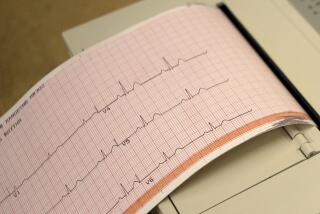Future wellness efforts may include advice based on genes

As medical advances continue to deliver ever-more effective treatments for symptoms and diseases, some doctors say it’s time to focus on keeping people from getting sick in the first place. In other words: Prevention needs to be the priority of the future.
Money is a major motivator. Americans spend more than $2.6 trillion on healthcare every year. That’s twice as much as other developed countries, says Dr. James Marks, director of the Robert Wood Johnson Foundation Health Group in Princeton, N.J. Yet the U.S. ranks dismally low on measures of longevity, infant mortality and other health outcomes.
“The amount of money we spend on illnesses we know how to prevent is staggering,” says Dr. Lloyd Michener, a family physician and community health researcher at Duke University Medical Center in Durham, N.C.
In every demographic category, research suggests, we can do better at keeping people well. A study published this spring by the Urban Institute Health Policy Center in Washington, D.C., for instance, found that nearly a quarter of healthcare costs spent on state employees in California went toward treating preventable diseases.
A focus on prevention could also allow the healthcare system to deliver better and more personalized care to people who need it most.
“It’s about broadening our perspective to realize that what has the biggest potential to really impact our health is not just about treating a body part after it gets sick,” says Dr. Denise Koo, a medical epidemiologist with the Centers for Disease Control and Prevention in Atlanta.
Here’s a look at some of the ways preventive care will improve in the future.
Making better choices
Most efforts at prevention will be focused on real-world choices that can help keep us healthy. If we can change our habits, rethink our communities and revamp our relationships with our doctors, some experts say, we could be entering a new era of health.
Close to half of Americans will be diagnosed with cancer in their lifetimes, and about half of all cancers are preventable, says Christina Clarke, an epidemiologist at Stanford University and a research scientist with the Cancer Prevention Institute of California.
Tobacco use accounts for a major chunk of those cases — it contributes to 10 types of cancer, along with cardiovascular disease, lung disease, low bone density and other problems, according to a recent report by the Robert Wood Johnson Foundation. Smoking is the No. 1 cause of preventable deaths in this country, and quitting reduces risks substantially.
Beyond cigarettes, diet and exercise are the next frontier. More than one-third of American adults and more than 15% of kids are obese, and they face an increased risk of heart disease, stroke, various cancers and type 2 diabetes.
If all Americans stopped smoking, exercised more and ate better, RWJF estimates, we could eliminate 80% of cases of heart disease and type 2 diabetes and 40% of cancers.
“We can help engineer our communities to help people make healthy choices,” Marks says. “If we do that, we can have a profound effect.”
The wealth gap
Some communities are far healthier than others, and closing that gap is one of the thorniest problems in preventive health.
A report released this summer by the Joint Center for Political and Economic Studies in Washington, D.C., found that Chicago residents who live in neighborhoods with a median annual income above $53,000 can expect to live nearly 14 years longer than residents with incomes below $25,000. And in California, life expectancy varies by more than 20 years depending on one’s ZIP Code.
Disease risks revealed
Some of the advances in prevention come straight from the laboratory, where scientists are learning to decipher specific genes that predict risks for diseases.
Ever since researchers began to sequence the human genome, there have been hopes that we might someday use that information to catch and fix flaws that lurk inside our cells.
Today, it’s possible — and even affordable — to have your entire genome sequenced, says Dr. Gianrico Farrugia, director of the Center for Individualized Medicine at the Mayo Clinic in Rochester, Minn. What’s still a work in progress, though, is figuring out what to do with all of that information.
Another problem is that genes alone don’t determine how our medical lives will play out. The food we eat and the chemicals we encounter influence how our genes behave.
To handle all that complexity, doctors will have to develop computer programs that combine “all of the genetic, environmental and behavioral factors to come up with individualized risks and preventions,” Michener says. “It needs to take into account that you may be willing to run, but you’re not willing to give up a glass of wine.”
Most promising for now, Farrugia says, are gene panels, which sequence a select set of genes with known functions. Some panels predict risks of various heart conditions. Others reveal risks of mitochondrial diseases and certain cancers. One panel that screens about 85 genes involved in metabolizing drugs can help doctors predict side effects and guide them toward the right medications at the right dose for each patient.
As more screening tests like these become available and as doctors gain a better understanding of what DNA sequencing can reveal, they will eventually be able to offer more personalized advice for each patient.
“We’re going to be able to keep people well in a way we never had an opportunity to do in the past,” Farrugia says. “This is a rapidly evolving field.”






